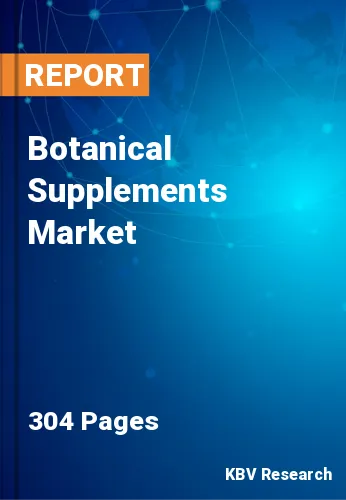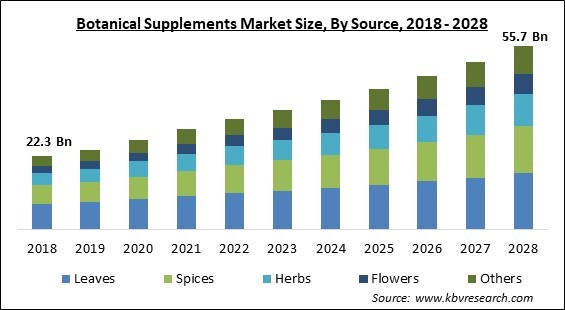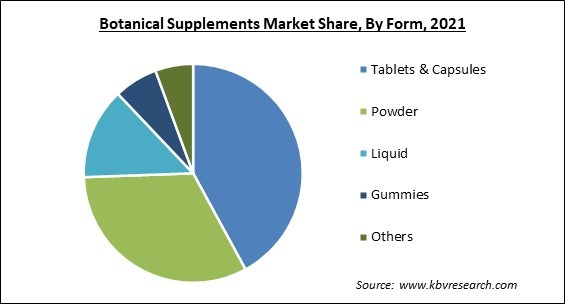
The Global Botanical Supplements Market size is expected to reach $55.7 billion by 2028, rising at a Market growth of 8.9% CAGR during the forecast period.
Botanical supplements lie within the category of dietary nutrients derived from plants. These supplements are prized for their medicinal or therapeutic benefits, as well as their taste and aroma. Manufacturers are emphasizing the launch of items with new and distinctive flavors. The emphasis is on introducing items that provide a variety of health benefits in order to sway health-conscious consumers.
As various producers continue to develop the process of creation of botanicals with a broad spectrum of amino acids and aim for specialized tasks like weight loss and muscle regeneration, the Market is predicted to increase dramatically. Rising health awareness has heightened concerns about diet, and increased attention to preventative healthcare has prompted people to seek out health-promoting botanical supplements. Several companies have released alternative therapies to help women with common issues including sleeplessness and menopausal hot flashes. Fish oils, detoxes, and probiotic drinks, as well as other botanical supplements, are becoming more popular. The Market for botanical supplements is projected to be fueled by consumers becoming more comfortable with supplementation, high-income levels, and world-class infrastructure for sports and exercise.
Ingredients like these can help with various elements of athletic performance abound in the sports nutrition and health Market s. For athletes wishing to increase their performance, these botanical substances can help with a variety of aspects of sports training. Furthermore, the existence of key competitors like Glanbia, Blackmores Limited, and The Himalaya Drug Company, as well as mass retailers like Walmart, who sell their own private labeled botanical supplements, is projected to boost the Market growth.
In January 2019, for example, Nestle S.A., with a humongous investment, launched its first R&D unit in Ireland. The new R&D center will concentrate on conducting scientific research to aid in the development of breakthrough newborn nutrition products and milk-based materials for the Market .

The outbreak of the COVID-19 pandemic has impacted the business domains significantly. According to a new poll by Nutritional Outlook, the increased knowledge of preventative health and immunity-boosting products is driving the consumption of botanical supplements in the United States. Immunity fell to the third position during the COVID-19 pandemic, following general wellness/disease prevention and gut/digestive health. Preventive health care is growing more popular among consumers. Governments and health organizations have urged consumers to use numerous botanical supplements containing health-promoting elements like turmeric/curcumin, fenugreek, and Tinosporacordifolia to enhance their immunity against various infections.
Consumer knowledge of the health advantages associated with the intake of botanical supplements including holy basil extract, which aids in the alleviation of anxiety, is projected to stimulate demand for botanical supplements. The demand for botanical supplements is expanding as a result of increased advertising and the simple availability of these supplements over the counter. Due to the sheer use of the internet and social media, consumers are increasingly prone to self-medicate. Over the forecast period, these factors are expected to propel the Market for botanical supplements forward.
The growing geriatric population in affluent countries such as the United States and Japan has resulted in enormous healthcare spending. Because alternative medications have few or no adverse effects, the senior population prefers to use them as a preventive health strategy. Botanical supplements are chosen by the aging population, which is increasing the Market for botanical supplements. According to a demographic census conducted in the United States, approximately 54 million people had crossed the age of 65 in 2019. These people are more likely to use personal healthcare items to meet their health needs as they age. This opens up the attractive potential for botanical supplement makers to sell products based on botanical extracts in the personal healthcare Market .
The lack of strong rules and regulations governing the safety and efficacy of botanical health supplement products is projected to stifle the Market 's expansion. Since manufacturers place less focus on product labeling and safety, the number of fraudulent health claims made in order to advertise their products has increased dramatically. These factors have influenced consumer perceptions of botanical supplements, which is projected to have a negative impact on the Market 's growth to some extent. Patanjali Ayurved (an Indian herbal supplement business) was fined $18,000 in December 2016 for misrepresenting product promotions.

Based on Source, the Market is segmented into Leaves, Spices, Herbs, Flowers, and Others. The herbs segment obtained a significant revenue share of the botanical supplements Market s in 2021. Herb-based pharmaceutical treatments are gaining popularity around the world due to their health benefits, which include increased metabolism and immune system, as well as hormone stabilization. Ayurveda, Yoga, Homoeopathy, and Siddha are just a few of the topics that are gaining traction, raising the demand for herbs-based botanical products.
Based on Form, the Market is segmented into Tablets & Capsules, Powder, Liquid, Gummies, and Others. The tablets & capsules segment acquired the largest revenue share of the botanical supplements Market in 2021. The segment has grown as consumers' preferences for tablets and capsules have shifted due to their simplicity of use. In addition, the significant expansion of the pharmaceutical business in emerging countries like China and India has contributed to an increase in tablet demand in the botanical supplement Market .
Based on Application, the Market is segmented into Energy & Weight Management, General Health, Bone & Joint Health, Cardiac Health, Immunity, Gastrointestinal Health, Diabetes, Anti-cancer, and Others. The cardiac health segment witnessed a significant revenue share in the botanical supplements Market in 2021. This is due to the increasing disposable income in developing countries, greater consumer inclination toward the use of botanical supplements has fostered a consistent expansion in recent years. Buyers in the Asia Pacific region are willing to pay more for cardiac health botanical supplements as the working population grows and the prevalence of chronic diseases rises. As a result, the heart health supplements Market has experienced rapid expansion, which is expected to continue throughout the forecast period.
Based on Distribution Channel, the Market is segmented into Online and Offline. The offline segment acquired the largest revenue share of the botanical supplements Market in 2021. The expansion of the offline segment has been aided by the increased incidence of self-medication for the treatment of serious health disorders and the growing preference for botanical supplements in daily use. Through offline stores, consumers can get assurance about the quality of the product as they can check the product first handedly. The increase in the offline distribution network sector can be linked to raising public awareness of general health concerns and the pharmaceutical industry's expansion. The growing trend among consumers to acquire offline drugs for a variety of minor ailments without consulting a doctor, as well as the dissemination of information and consultation in reputable media about the functions of botanical supplements, has driven the industry's rise in major regions.
| Report Attribute | Details |
|---|---|
| Market size value in 2021 | USD 30.3 Billion |
| Market size forecast in 2028 | USD 55.7 Billion |
| Base Year | 2021 |
| Historical Period | 2018 to 2020 |
| Forecast Period | 2022 to 2028 |
| Revenue Growth Rate | CAGR of 8.9% from 2022 to 2028 |
| Number of Pages | 304 |
| Number of Tables | 530 |
| Report coverage | Market Trends, Revenue Estimation and Forecast, Segmentation Analysis, Regional and Country Breakdown, Companies Strategic Developments, Company Profiling |
| Segments covered | Source, Form, Application, Distribution Channel, Region |
| Country scope | US, Canada, Mexico, Germany, UK, France, Russia, Spain, Italy, China, Japan, India, South Korea, Singapore, Malaysia, Brazil, Argentina, UAE, Saudi Arabia, South Africa, Nigeria |
| Growth Drivers |
|
| Restraints |
|
Based on Regions, the Market is segmented into North America, Europe, Asia Pacific, and Latin America, Middle East & Africa. The North American region acquired the largest revenue share of the botanical supplements Market in 2021. The expanding consumption of dietary supplements, together with rising knowledge of supplements infused with botanical elements, is a major driver driving Market expansion in the region.
Free Valuable Insights: Global Botanical Supplements Market size to reach USD 55.7 Billion by 2028
The Market research report covers the analysis of key stake holders of the Market . Key companies profiled in the report include Ricola Group Ltd., Nutraceutical Corporation, Blackmores Limited, Dabur India Ltd., Mondelez International, Inc., The Procter and Gamble Company, Glanbia PLC, BASF SE, The Bountiful Company (Nestlé SA), and The Himalaya Drug Company (Himalaya Global Holdings Ltd.)
By Source
By Form
By Application
By Distribution Channel
By Geography
The global botanical supplements market size is expected to reach $55.7 billion by 2028.
Adoption of botanical Supplements by the elderly are driving the market in coming years, however, lack of regulation and false advertising growth of the market.
Ricola Group Ltd., Nutraceutical Corporation, Blackmores Limited, Dabur India Ltd., Mondelez International, Inc., The Procter and Gamble Company, Glanbia PLC, BASF SE, The Bountiful Company (Nestlé SA), and The Himalaya Drug Company (Himalaya Global Holdings Ltd.)
Preventive health care became more popular among consumers. Governments and health organizations have urged consumers to use numerous botanical supplements containing health-promoting elements like turmeric/curcumin, fenugreek, and Tinosporacordifolia to enhance their immunity against various infections.
The Leaves segment acquired maximum revenue share in the Global Botanical Supplements Market by Source in 2021, thereby, achieving a Market value of $16.9 billion by 2028.
The North America is the fastest growing region in the Global Botanical Supplements Market by Region in 2021, and would continue to be a dominant Market till 2028.
Our team of dedicated experts can provide you with attractive expansion opportunities for your business.
